Not Your Father’s Military
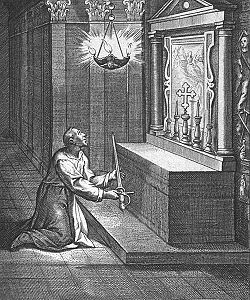
St. Ignatius
surrenders his weaponsSt. Ignatius of Loyola, founder of the Society of Jesus, became a “soldier of Christ,” laying down his worldly weapons before the statue of the Black Madonna at Montserrat and exchanging his royal clothes for the rags of a beggar. Both before and after his conversion, he was a Catholic; but only after his conversion was his first loyalty to Jesus and not to the state.
The modern Jesuit university, Marquette University being one example, is doing the reverse. It is taking up the weapons of war at the request of the government and is adapting its Christian values to accommodate military education and training. It still calls itself Catholic, but has made itself beholden to the governing authority, with its immense military establishment, and in the process is marginalizing the teachings of Jesus and of the Church.
In 1968, at the height of the civil rights and peace movements, Marquette gave in to the pressures of students and society and opened it’s doors more widely to minority students. However the same year when many of the same students who had worked for civil rights began resisting the military presence on campus, Marquette held it’s ground.
Since that time, Jesuit universities have increasingly permitted the militarization of education. The military presence today on Jesuit campuses makes what was permitted in 1968 pale in comparison.
Marquette University, to give an example, is now one of only two universities in Wisconsin to host three departments of the military — Army, Navy/Marines and Air Force — on campus. It now accredits students from 14 colleges and universities in the region for military training, despite the significant change of military training and values away from Christian moral and ethical values. Modern warfare and military training has radically changed since World War II. The military presence on Jesuit campuses is no longer that of our father’s experiences or that which we may recall from our own more distant experiences.
What I am about to say can be said of all Jesuit universities in the United States that host military training on campus.
Reflexive Killing
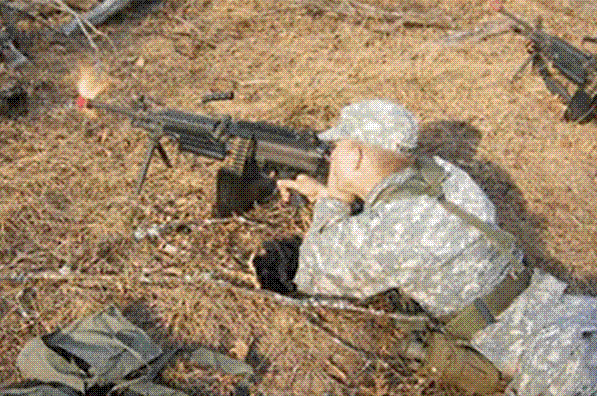
Jesuit student in trainingAfter World War II, the military discovered that in combat just one of four soldiers fired their weapons in battle. So the military developed a new way for soldiers to fire their weapons. This new way of engaging weapons has various names, “reflexive fire drills” or “reflexive killing.” In the movie “Soldiers of Conscience” it is well described by an ROTC instructor on a college campus and by a Military instructor at West Point: ”Modern combat training conditions soldiers to act reflexively to stimuli — such as fire commands, enemy contact, or the sudden appearance of a ‘target’ — and this maximizes soldiers’ lethality, but it does so by bypassing their moral autonomy. Soldiers are conditioned to act without considering the moral repercussions of their actions; they are enabled to kill without making the conscious decision to do so.” 1 This new method of training has raised the ratio of engaging weapons to 95% but, as CPT Pete Kilner’s paper to The Joint Services Conference on Professional Ethics points out, with grave consequences “since soldiers may kill reflexively, eventually the soldiers return home and reflect on their actions.” Do we want this way of killing without conscience taught at Catholic Jesuit colleges?
Loyalty to Military over Conscience
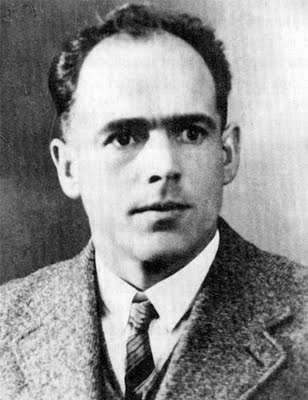
Blessed Franz JägerstätterThe military manuals, such as the Army manuals, have significantly changed over the years. For example, the present Army training and leadership manual states: “Your personal values may and probably do extend beyond the Army values, to include such things as political, cultural, or religious beliefs. However, if you’re to be an Army leader and a person of integrity, these values must reinforce, not contradict, Army values.” 2 Yet the Catholic Catechism states “The citizen is obliged in conscience not to follow the directives of civil authorities when they are contrary to the demands of the moral order, to the fundamental rights of persons or the teachings of the Gospel. Refusing obedience to civil authorities, when their demands are contrary to those of an upright conscience, finds its justification in the distinction between serving God and serving the political community.” 3 Whoever would have thought that, after the Nuremberg Trials, students would be taught at Jesuit Catholic universities to “just follow orders?” Can Catholic Jesuit Universities serve both the state and the church on this question of conscience?
Freedom of Speech
After the involuntary Selective Service System was ended in the 1970′s many colleges and universities for reasons of academics, morals, ethics or discrimination dropped their military training programs on campus. As the number of colleges and universities willing to offer this new way of military training diminished, the military, through the congress, decided to act. In 1996 Congress passed the Solomon Amendment.4 This act is “a United States federal law that allows the Secretary of Defense to deny federal grants (including research grants) to institutions of higher education if they prohibit or prevent ROTC or military recruitment on campus.” This law was challenged by the Notre Dame Law School and in 2006 was upheld by the Supreme Court. The only exemption is for an institution with “a long standing policy of pacifism based on historical religious affiliation.”
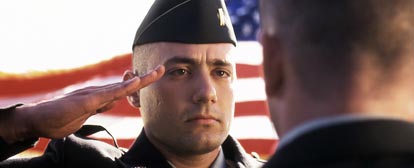
Georgetown Cadet SalutesThe passage of this law forced colleges and universities to be “partner” or “host” military schools. Most schools, including some well known schools like Harvard, Columbia and Stanford, became “partner” schools. Military recruiters were allowed on campus, however the military students at the school were sent to “host” schools for military training. This way the partner school could maintain all Federal funding and scholarship money without actually having military training on campus. Some select schools, including most major Jesuit universities like Marquette or Georgetown, became “host” schools, which house military training on campus in Departments of Military Sciences. Unlike other departments, the host university has little or no control over the curriculum or academic standards of these departments.
Although recruiting by the military on university campuses has been ruled legal under our constitution, the issue of forcing schools to offer certain programs at colleges and universities is being challenged in the court system at this time. Lawyers are raising constitutional freedom of speech questions. How can the government force a university to offer certain programs?
The military has paved major roads into our high school education with JROTC and in our grade schools with the Department of Defense “Starbase” program. These two military training programs for high schools and grade schools are aimed towards “at risk youth” to become enlisted soldiers while the university campus men and women are trained to be officers. Sadly, in our country today, most soldiers give as their reason for joining the military… “to get an education.”
Although all military students, both in partner schools and host schools, enjoy a scholarship for education, and both have access to all Federal grants, there is much more involved for Jesuit universities that host military departments. What is the difference and why do so many Jesuit schools rank highly as military host schools?
Money
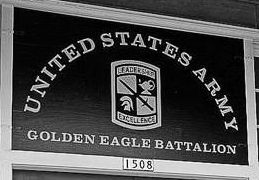
Sign of ContradictionMarquette administrators have refused to answer questions about how much more a host school benefits financially, compared with a military partner school. We know that in terms of scholarships and Federal grants availability, there is no difference. Marquette does rent space on campus to the Navy/Marines and Air Force for military training and, according to military personnel, has sold a building and space on campus to the Army for the training of the “Golden Eagle Battalion.” There are hints of substantial other financial benefits for being a military host school, and the great secrecy involved in military payments to Marquette University only leads to suspicion that there is a significant amount of money for hosting Departments of Army, Navy/Marines and Air Force on campus.
Honors
Being a major military training base for the region does bring some honor. Fr. Wild S.J., the president of Marquette University, has stated: ”As such, I as President am proud of Marquette’s long-standing affiliation with ROTC.” Also when Fr. Wild S.J. was faced publicly with the question: “Is the War in Iraq moral?” a university representative said on local TV news, “The University is a place where the question of what constitutes a just war can be debated freely and respectfully. But ultimately, that decision rests with our elected leaders.” 5. In general, Fr. Wild has maintained the position of ignoring the moral and ethical question of military training on campus and has consistently stated, “There is no dialog possible on this issue.”
Pride
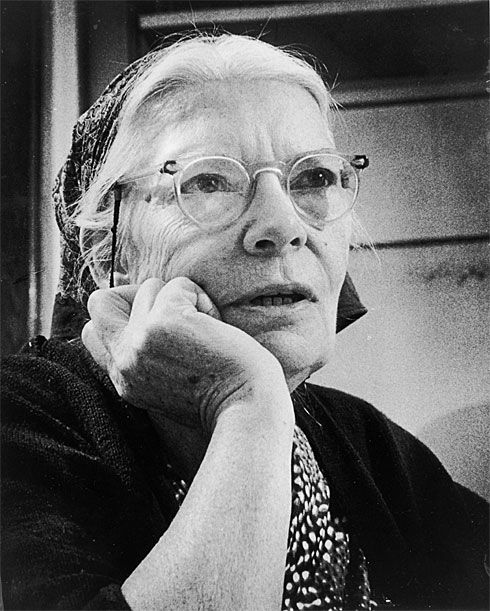
Dorothy DayMarquette not only hosts Departments of Army, Navy/Marines and Air Force but it also, ironically, hosts the archives of Dorothy Day and the Catholic Worker movement. Dorothy Day, in refusing to take honorary degrees from Catholic Colleges like Marquette, clearly states as a primary reason the fact of military training on campus. A few years ago when the question of military training on campus was renewed, Marquette brought in a well known Jesuit peace activist to start a “Center for Peacemaking”. However, the Center has refused to acknowledge the ethical and moral consequences of military training on campus and has worked to marginalize any who raise that concern. Marquette University takes great pride in the Catholic Worker Archives, the Peace Center and the military on campus.
This brings us full circle back to St. Ignatius of Loyola. In his “Spiritual Exercises”, St. Ignatius presents a reflection on two leaders and two strategies. The strategy of Lucifer “is simple and seems so light-filled and clear in its direction: riches (or ‘this is mine’), to honor (or ‘look at me’) to pride (or I AM…).”6 The other leader’s, Jesus’, strategy is also simple, “although at first it seems like a paradox. If I have been graced with the gift of poverty (‘he emptied himself, becoming human’) then I am rich; if I have nothing of myself (‘everything I have is from the Father’), I have no power and I am despised and receive the contempt of the world (‘even to death, death on a cross’); if I have nothing, my only possession is Christ (‘Christ is God’s’) and this is to be really true to myself — the humanity of a person whose whole reality and value is grounded in being created and redeemed in Christ.” 7
Jesuit higher education has made a choice in becoming a leader in contributing to the militarization of our society. Perhaps Marquette and other Catholic Jesuit educational institutions need to offer military recruiting and programs in order to survive. But there is no law forcing them to host the military, to teach and train soldiers on campus in ways of war and in values contrary to the teachings of the Catholic Church.

Father Ignacio Ellacuria S.J.It is that time again when Marquette University and other Jesuit high school and university students go to Fort Benning to protest the School of the Americas (SOA). They do this to honor the Jesuit martyrs who were killed by graduates from American military training programs. But one of the Salvadoran martyrs, Father Ignacio Ellacuria, in an interview by John Dear S.J. in 1985, was asked about the military officer training program at Georgetown, a Jesuit Catholic University. He said: “Tell the Jesuits of Georgetown that they are committing mortal sin because they are supporting the forces of death which are killing our people.” 8 Father Ellacuria was assassinated in 1989 by soldier graduates trained thru the SOA.
Perhaps today we need to say, “Jesuit Fathers and Brothers, the military teaching and training you host on Catholic campuses is contrary to our Catholic faith and not in harmony with the wishes of our Jesuit fathers, Ignatius and Ignacio. Be Faithful to the Gospel and no longer host the Army, Navy/Marines and Air Force on Jesuit Catholic campuses.”